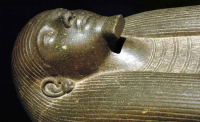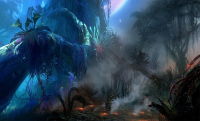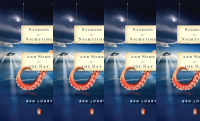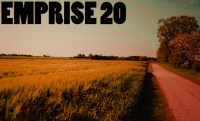End Zone
Page 111 (Penguin CAF edition)
(The spectator, at this point, is certain to wonder whether he must now endure a football game in print–the author’s way of adding his own neat quarter-notch to the scarred bluesteel of combat writing. The game, after all, is known for its assault-technology motif, and numerous commentators have been willing to risk death by analogy in their public discussions of the resemblance between football and war. But this sort of thing is of little interest to the exemplary spectator.
–End Zone
Don DeLillo
Fiction Quoted | Don DeLillo, End Zone, NFL |
Posted 08/29/2011 by Patrick
The Wolf Who Cried Boy
Sam Rasnake
There was a boy who cried wolf. We know this fable, and call
it the beginning of literature. Thing with no name. But truth is
– it was a wolf who cried boy. According to Kafka, anticipating
Nabokov, the origin of literature is when a wolf comes down
from the crags, out of the dark, forbidding forest, and into the
open, crying, “Boy! Boy!” but there is no boy. The pack is, of
course, astounded, mesmerized. Someone first tells it. Someone
writes it down. Dreams it. And so on.
There had to be a wolf, eventually – we all know this – to write
it down. A book written by a wolf – about people no less, about
trucks, banks, and pots full of water, about blazing fires and
mountain laurel, sheep and cattle. On the back cover, he wears a
jacket and jeans, a fedora and scarf, one paw at his hip. His bio
reads: “His work has been widely published in The Village
Voice, Conundrum, Teton Tales, and Alpha. The first wolf to be
recipient of a Fulbright, he studied literature and architecture in
the Carpathians. For two years he wrote a weekly column for
the Denver Times, ‘The Poet and the Beast.’ Living in the
Wyoming Basin, he directs a creative writing program from his
den.”
The story begins … There were no pigs’ huts of straw or stick or
stone. No chimney or door. Nothing worth his time to enter,
nothing to tear down for another meal – which was quite
disturbing, even for a wolf, since the times were so depressed
and one never knew where the next meal, if and when, might be
coming. Of the book, critics write of how well the protagonist
assimilates the mind of a pig. Thumbs up. Five stars. Book of
the Week. A sales ranking of 383. “More real than real.”
—-
—-
Sam Rasnake’s works have appeared in OCHO, Big Muddy, BLIP, Literal Latté, MiPOesias, A-Minor Magazine, BluePrint Review, Best of the Web 2009, BOXCAR Poetry Review Anthology 2, and Dogzplot Flash Fiction 2011. He is the author of Lessons in Morphology (GOSS183) and Inside a Broken Clock (Finishing Line Press).
From The Issue | Kafka, Sam Rasnake |
Posted 08/26/2011 by Emprise
And Some For The Day
Reviewed by Nathan Huffstutter
2011, Penguin Books
210 pages, paperback
A guy walks in to a bar and sees a miniature man sitting on a table playing a miniature piano…
Heard that one before? Go ahead and stop me if you must, but keep in mind, if we can’t use a quick shot of taphouse badinage as an entry point into Stories for Nighttime And Some for The Day, our next alternative is a sober dissertation on monomyths and Old Joe Campbell.
Right. So where were we? Opening lines? Here – take a crack at a few of Ben Loory’s:
–“A man comes home from work one day to discover his daughter has found God.”
–“A hunter returns to his village one night with a severed human head in one hand.”
–“A man is walking through the woods, when suddenly he sees Bigfoot.”
In stories that hit the ground running, using sentences of pure declarative efficiency, Loory seizes his unnamed protagonists and thrusts them into confrontation with the fantastic: flying saucers and domesticated martians, creatures from the deep dark sea and the deeper, darker subconscious, a heaven-sent pig, a talking moose, Bigfoot, practically everything but the proverbial wish-granting genie and that tiny piano player. And like those well-oiled jokesmiths, steeped in the badda-bing of Preparation/ Anticipation/ Payoff, Loory begins with form and allows each curious wonder to reveal itself.
Back to beginnings, again, Stories for Nighttime… opens with a nifty one-two-three, a trio of shorts that individually showcase Loory’s command of structure and, in combination, execute that traditional progression of preparation, anticipation, payoff. “The Book” quickly presents a relatable phenomenon: a woman returns home with a stack of new reading, only to discover the last book in her pile has one-upped Davis Schneiderman and is, literally, nothing but blank pages. Outraged, the woman rails both against the book’s failure to meet her expectations and the prevailing acceptance of those empty pages, becoming so consumed with opposition she gains a measure of discontented fame denouncing the work in a book of her own. Continue reading →
Reviews | Ben Loory, Penguin, Stories For Nighttime and Some For The Day |
Reviewed by Adam Tavel
2011, Salmon Poetry
72 pages, paperback
To ask an American poet about international verse is often a waiting game, wherein one counts how many ticks of the second hand it takes for the responder to sing Neruda’s praises, quizzically gaze out the window, and deftly change the subject after a dramatic pause like a Wes Anderson protagonist. With the proliferation of, and plurality within, our many aesthetic cliques, it is lamentable that so few of us (this reviewer included) break out and explore the many emerging voices in the grand chorus of English language poetry. Such were my sentiments as I recently devoured Adam Wyeth’s mature and emotionally nuanced debut, Silent Music, as its central themes of divorce, transgression, and identity (in this case, Anglo-Irish) are vital to our Yankee discourse, but more importantly, his is an impressive and rangy collection that sidesteps the plangent gestures that so often mar first books.
Equally skilled in form and free verse, Wyeth displays the variety, zest, and invention one finds in the early work of Heaney and Lowell, since his best poems unfurl with organic pathos, rugged bravado, and rustic charm. Time and again, poems such as “Rough Music,” “Dad,” and “Blackout” occupy a third space that defies the quaint artificial division between lyric and narrative, whether Wyeth takes domestic violence, divorce, or the loss of innocence as his subject. Indeed, Silent Music is unflinching in both subject and theme, too—just in the first half-dozen poems, both poet and reader confront colonialism, landscape, grief, alcoholism, memory, and belonging. Continue reading →
Reviews | Adam Tavel, Adam Wyeth, Salmon Press, Silent Music |









